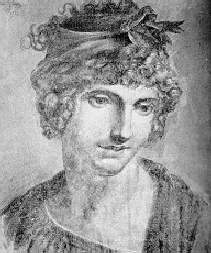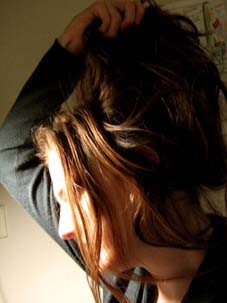This years Amnesty Award at the CPH:DOX film festival will go to a movie that puts women in focus. The nominees definitely sound worth a view:
'American Blackout': the black democratic politician Cynthia McKinney dared to ask critical questions regarding the political line of the Bush administration following 9/11.
'Enemies of Happiness': the risky election campaign of the young Afghan women politician Malalai Yoyas. Meet Malalai Yoyas or find another interesting seminar to attend here.
'Carla´s List': lead prosecutor Carla del Ponte´s work to convict war criminal from the civil war in the former Jugoslavia.
'City Walls: My Own Private Teheran': the battle of Iranian women for independence.
'Maquiliapolis: City of Factories': five Mexican women fight for better working conditions at big multinational factories in Tijuana.
Besides the women's theme 'The prize of the pole' and 'The substitute' also sound really interesting.
So: if you're in Copenhagen during this week I recommend treating yourself with a documentary.
What's up, Europe? Gender, media and European integration. The story of a a young Dane exploring the continent.
Monday, November 13, 2006
Wednesday, November 08, 2006
Republican or democrat?
Take My Poll
I am curious about the political orientations of the visitors of my blog. Please take a few seconds to answer my poll. Thanks!
I'll post something on the result later.
PS - feel free to leave a comment and explain your motivation and/or let me know your nationality.
R.
I am curious about the political orientations of the visitors of my blog. Please take a few seconds to answer my poll. Thanks!
I'll post something on the result later.
PS - feel free to leave a comment and explain your motivation and/or let me know your nationality.
R.
Beginning of the end?
20 minutes ago I found this note from my American flat mate:
"Hi R., Democrats won the House! Senate undecided :-) See you in class!"
Good morning!
"Hi R., Democrats won the House! Senate undecided :-) See you in class!"
Good morning!
Wednesday, November 01, 2006
Famous feminist #5
 In 1789, in the French Revolution, French citizenship was defined in the document, Declaration of the Rights of Man and of the Citizen. From 1789 until 1944, French citizenship was limited to males -- even though women were active in the French Revolution, and many assumed that citizenship was theirs by right of their active participation in that historic liberation battle.
In 1789, in the French Revolution, French citizenship was defined in the document, Declaration of the Rights of Man and of the Citizen. From 1789 until 1944, French citizenship was limited to males -- even though women were active in the French Revolution, and many assumed that citizenship was theirs by right of their active participation in that historic liberation battle. Olympe de Gouges (1748-1793), a playwright of some note in France at the time of the Revolution, spoke for not only herself but many of the women of France, when in 1791 she wrote and published the Declaration of the Rights of Woman and of the Citizen. Modeled on the 1789 Declaration of the National Assembly, defining citizenship for men, this Declaration echoed the same language and extended it to women, as well.
For asserting this equality, and repeating the assertion publicly -- for refusing to be silent on the rights of Woman -- and for associating with the wrong side, the Girondists, as the Revolution became embroiled in new conflicts -- Olympe de Gouges was arrested in July 1793, four years after the Revolution, and more than two hundred years ago. She was sent to the guillotine in November of that year.
A report of her death at the time said:
"Olympe de Gouges, born with an exalted imagination, mistook her delirium for an inspiration of nature. She wanted to be a man of state. She took up the projects of the perfidious people who want to divide France. It seems the law has punished this conspirator for having forgotten the virtues that belong to her sex."
In the midst of a Revolution to extend rights to more men, Olympe de Gouges had the audacity to argue that women, too, should benefit. Her contemporaries were clear that her punishment was, in part, for forgetting her proper place and proper role as a woman.
Source: womenshistory.about.com
5 things feminism has done for me
I have been tagged! In this matter I agree with Tersely that the task is impossible to solve if we understand 'feminism' in its broad sense. 'Feminism' is a term that covers many different, at times contradictory, ways of thinking. It is an 'ism' and an 'ism' in itself does not really do anything to anyone.
However, I see one way of providing meaningful answers. That is to understand feminism as two particular periods of political activism in the Western world. The first being the suffragette movement in the 1910s. The second being the women's movement in the 1970s. So here goes the not-so-surprising-answers:
Five things feminism has done for me
1. I have the legal right to vote. In Denmark women won voting right in 1915.
2. I can be participate in society and political life without having to struggle with an attitude like this: "I have a mother, and I have a wife and a sister and daughters, and I wish to continue in the position of their supporter and their protector [Â…] I do not wish them to have extended to them the right not only to vote, but to sit in this Chamber. It is man's duty to be here, and it is woman's duty to attend to the family." (this was said by William Knox in an Australian House of Assembly debate in 1902. More interesting quotes at the Parliament of Australia web page)
3. I do not depend on father, brother or husband for economic support.
4. I have the legal right to abortion. Since 1972 Denmark there has been free abortion in Denmark.
5. That I can have a relationship where it is me and my partner, and not tradition, who decide which duties belong to whom.
I pass the question on to Mig og Verden, Morten Sørensen, European Scribbler, Klumbs Univers and Åbenlys Urimelig. If you are up for answering feel free to define feminism in another way than I have done.
However, I see one way of providing meaningful answers. That is to understand feminism as two particular periods of political activism in the Western world. The first being the suffragette movement in the 1910s. The second being the women's movement in the 1970s. So here goes the not-so-surprising-answers:
Five things feminism has done for me
1. I have the legal right to vote. In Denmark women won voting right in 1915.
2. I can be participate in society and political life without having to struggle with an attitude like this: "I have a mother, and I have a wife and a sister and daughters, and I wish to continue in the position of their supporter and their protector [Â…] I do not wish them to have extended to them the right not only to vote, but to sit in this Chamber. It is man's duty to be here, and it is woman's duty to attend to the family." (this was said by William Knox in an Australian House of Assembly debate in 1902. More interesting quotes at the Parliament of Australia web page)
3. I do not depend on father, brother or husband for economic support.
4. I have the legal right to abortion. Since 1972 Denmark there has been free abortion in Denmark.
5. That I can have a relationship where it is me and my partner, and not tradition, who decide which duties belong to whom.
I pass the question on to Mig og Verden, Morten Sørensen, European Scribbler, Klumbs Univers and Åbenlys Urimelig. If you are up for answering feel free to define feminism in another way than I have done.
Subscribe to:
Posts (Atom)

